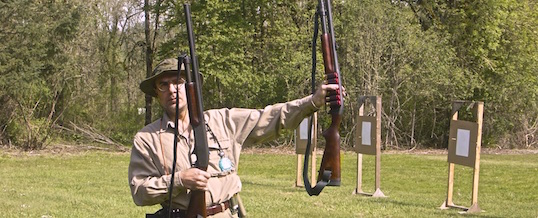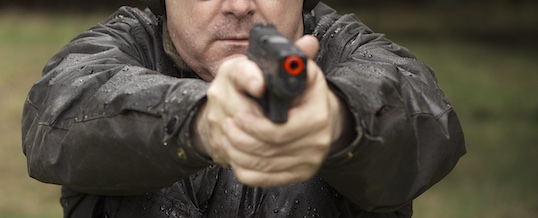
Choosing the ‘pool gun’ for your family and home defense: what’s best?
If you keep a firearm for home defense (more specifically, defense of yourself and others while in your home — we don’t use lethal force to defend mere property), it’s entirely possible that there may be more than one person who is authorized, capable of or likely to need to use it. You may have a spouse or responsible children who would need to use a firearm to defend themselves and the family should a threat present itself. It’s under those conditions that they might access the home defense weapon, the gun which is staged specifically for such an incident. We call those guns “pool guns”, as in a motor pool, because it’s available for anyone (who is authorized, of course) to use when necessary.
When I was growing up our pool gun was a Winchester Model 12 shotgun in a corner of our utility room. We had a box of shells on a high shelf, and I knew where they were and how to load and operate the shotgun in a hurry. I don’t think my mother ever knew how to operate it, and neither of my sisters really cared; if someone broke in, it was my father and I who would be using the old Winchester. It was a pool gun for a pool of two!
If your family is like most, not everyone in your household is going to be authorized or interested in learning to use that defensive firearm; and, unless your family is quite unique, not all of the people who would use it have equal abilities or training. It’s not at all unusual, in fact, to find that only one person in the household is the firearms or defensive shooting enthusiast, while the others are really only passingly familiar with the pool weapon and how it functions.
Your gun might not be their gun
Let’s say, for instance, that you’re the firearms expert and enthusiast in your household. (This isn’t too much of a stretch, because if you’re reading this you probably are by definition!) Let’s also say that your spouse tolerates your guns and only grudgingly shoots enough to maintain some familiarity with shooting, and that you have a responsible teenager who nevertheless likes Instagram a whole lot more than the gun store. Between you and them there’s a wide range of interest and abilities.
The issue at hand is that those widely diverging abilities, and probably widely diverging physical characteristics, means that the pool gun has to fit a wide range of people. Now if you carry a defensive firearm daily it’s entirely likely and preferable that you picked one based on your own physiology and abilities. You chose the one that you could operate easily, which fit your hand so that all of the controls were easily accessible, and one which you could handle in terms of things like recoil control. That’s a big part of how I recommend people pick a defensive tool, and it’s perfectly fine for the gun you carry on your person — because you’re the only one you have to please!
When it comes to the pool weapon, however, the gun which fits you may not fit the other people who might end up using it. A gun which is too large or on which smaller hands can’t reach necessary controls, or one which has recoil beyond their ability to control, will not be an efficient tool for them to use to defend themselves. It might even be counter productive when a delay caused by an inability to use it efficiently gives their attacker the opening and time to disarm them.
Pick the home defense firearm to fit them, not you
If you’re choosing a firearm for family defense you need to give more thought to the matter. You need to pick a gun that you can use, but also one which the other members of your family can use easily as well. Sometimes that means looking beyond your preconceived notions of what an “ideal” home defense gun is, or getting past the testosterone-fueled bravado that you often find on the range. You need to pick something that fits everyone reasonably well instead of something which fits only one person perfectly. The old saying that “perfect is the enemy of good” certainly applies here!
To start with, the handgun — which is usually the first choice as a home defense tool, as it’s versatile, easily stored, and easy to handle in confined spaces — may not be the best choice for a pool firearm. The handgun requires more time and effort to develop and maintain a minimum level of skill than does a long gun; if your family will get to the range a few times a year to practice with a handgun, this might not be an issue. For those who don’t, however, the handgun may not be the optimal choice. A long gun may be more viable in those cases, as they’re easier to shoot to any given level of precision at any given distance than is a handgun.
Regardless of whether you pick a handgun or a long gun, it’s vital that the person with the smallest hands or shortest arms be able to operate it. They have to be able to reach the trigger, any safety devices, and be able to rack the slide or pull the charging handle. The sighting system also has to be usable by everyone, even by those in the family who might wear glasses.
Believe it or not, too small is much better than too big
When picking a gun to fit all family members, remember that in general it’s easier for someone to deal with a too-small firearm than one which is too large; this is especially true if the person using the smaller gun is more highly trained or skilled. The person with less training, skill or ability generally finds a large firearm extremely difficult to operate and that often translates to not being able to even hit a target. Better to pick a gun which you find too small but which your spouse can easily handle than one which fits you perfectly but the rest of the family struggles with. A handgun needs to be sized so that the smallest hand can reach the trigger; the stock on a long gun should be sized so that everyone can get it to their shoulder and easily reach the trigger and forearm without excessive blading of the body or inducing a forced lean to see the sights.
Power, translated into recoil, is also something you must consider. You may be able to handle the hard kick of a 12-gauge magnum shotgun, but what about that 110-pound 17-year-old in the next room? I know the 12-gauge made its reputation as the king of manstoppers, but I think you’ll find that no bad guy is ever going to notice the difference in being hit by it or by the much lighter, lower-recoiling, easier-to-control 20-gauge. They’re both more than “enough” to deal with the problem, but the 20-gauge will be usable by more people.
One of the reasons I’m a fan of the pistol-caliber carbine as a home defense tool is precisely because they make very good pool weapons. They tend to be small, light, have very minimal recoil, are insanely easy to shoot and hit with, and are still enough to put down the bad guy whose made his way into your house. Is it perfect? No. Is it likely to be exactly what everyone in a given household can use efficiently? Yes. Is it likely to be more than enough to deal with any plausible threat? Yes.
Your pool weapon may not be the pistol caliber carbine, and that’s perfectly fine, but if you really are concerned about your family’s safety you need to pick the home defense gun to fit everyone — regardless of size, strength, or ability. That’s the way to maximize everyone’s ability to use the pool firearm to defend themselves and the rest of the family!
– Grant Cunningham
- Posted by Grant Cunningham
- On February 26, 2016



